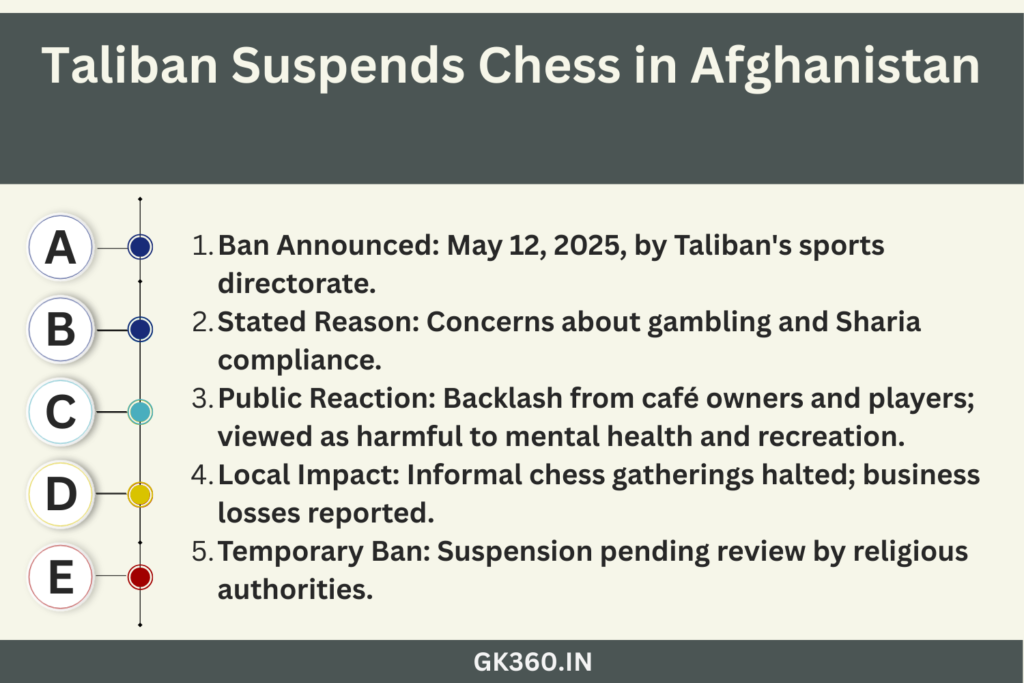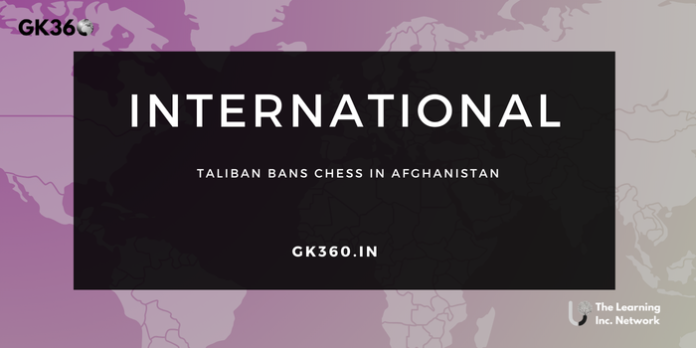Taliban Bans Chess in Afghanistan: A Sharia Law Controversy
On May 12, 2025, the Taliban regime in Afghanistan officially suspended the sport of chess, citing concerns over its compliance with Islamic law. The decision, announced by the Taliban’s sports directorate, reflects an intensifying trend of cultural and recreational restrictions in the country since the regime’s return to power in 2021. While framed as a temporary move pending religious review, the ban has sparked widespread concern both domestically and internationally.
This development adds to a growing list of prohibited activities, including women’s sports and MMA, marking another step in the Taliban’s rigid interpretation of Sharia law. As chessboards vanish from Kabul’s cafés and parks, the move has ignited debates over personal freedoms, mental well-being, and Afghanistan’s cultural future.
Table of Contents
- 1. Why the Taliban Banned Chess
- 2. History of Sports and Cultural Bans Under Taliban Rule
- 3. Current Announcement and Key Details
- 4. Reactions in Kabul and Across Afghanistan
- 5. International Condemnation and Muslim-World Comparison
- 6. Broader Implications for Afghan Society
- 7. FAQs: Chess Ban in Afghanistan (2025)
- 8. Conclusion: The Price of Cultural Repression

1. Why the Taliban Banned Chess
According to Taliban officials, the suspension of chess stems from its perceived incompatibility with Islamic values. The primary justification centers on the belief that chess may promote gambling, which is strictly forbidden under Sharia law. While no direct scripture explicitly bans chess, conservative scholars within the regime argue that the game can distract from religious duties and lead to idle behavior.
This interpretation, however, contrasts with the stance taken in other Muslim-majority countries, where chess is actively promoted in schools and national tournaments.
2. History of Sports and Cultural Bans Under Taliban Rule
Since retaking power in August 2021, the Taliban have methodically reintroduced restrictions reminiscent of their previous rule in the 1990s. Their governance has included widespread limitations on women’s rights, media censorship, and now, increasingly, recreational activities.
Notable Bans:
- ❌ MMA (Mixed Martial Arts): Prohibited due to physical exposure and aggressive conduct.
- ❌ Women’s Sports: Banned across all levels, including education and national teams.
- ❌ Live Music & TV Shows: Restricted as part of broader cultural censorship.
The chess ban is viewed as a continuation of this ideological framework aimed at controlling public life and social behavior.
3. Current Announcement and Key Details
On May 12, 2025, the ban was formally declared by Atal Mashwani, a spokesperson for the Taliban’s sports directorate.
Official Statement Highlights:
- 📅 Date: May 12, 2025
- 🗣️ Announced By: Atal Mashwani
- 📍 Scope: Nationwide chess suspension
- ⚖️ Condition: Ban remains until reviewed by religious scholars for Sharia compliance
Though declared as “temporary,” there is no defined timeline for the review’s outcome, leaving the future of chess uncertain in Afghanistan.
4. Reactions in Kabul and Across Afghanistan
The suspension has deeply impacted local communities, especially in Kabul, where chess had long been a cherished pastime in cafés, parks, and community centers. Café owners and chess enthusiasts lament the sudden halt to a game that served not only as entertainment but also as a tool for mental stimulation and social bonding.
“This is not just a game for us,” says Azizullah Gulzada, a café owner in Kabul. “Chess helps young people stay mentally engaged. Now we’re left with silence and sorrow.”
The ban has also affected businesses, with chess-themed venues losing customers overnight.
5. International Condemnation and Muslim-World Comparison
Human rights organizations, chess federations, and international observers have condemned the decision, highlighting its impact on personal freedoms and mental well-being.
Critics point out that the ban contradicts the practices of other Islamic nations:
- 🇮🇷 Iran: Hosts national and international chess tournaments.
- 🇪🇬 Egypt: Encourages chess in schools.
- 🇮🇩 Indonesia: Actively promotes chess as a tool for youth development.
These examples challenge the notion that chess is inherently un-Islamic, raising questions about the Taliban’s isolated and extreme interpretations of religious doctrine.
6. Broader Implications for Afghan Society
The chess ban underscores a broader trend of shrinking civil liberties in Afghanistan under the Taliban. While the regime insists it is acting in accordance with religious values, critics argue that these measures erode intellectual freedom, stifle recreation, and contribute to mental health crises, especially among the youth.
Chess, often hailed as a game that fosters critical thinking, patience, and strategy, once served as a peaceful intellectual outlet in a country long troubled by conflict. Its suspension sends a signal to Afghan citizens—and the world—that even harmless recreational activities may be subjected to ideological scrutiny.
Social Repercussions:
- 🔇 Suppressed forms of self-expression
- 🧠 Reduced access to cognitive and recreational outlets
- 📉 Loss of community engagement spaces
- 🧍 Marginalization of youth and creatives
As these cultural restrictions grow, so too does the international concern over Afghanistan’s future as a closed society.

7. FAQs: Chess Ban in Afghanistan (2025)
- Why did the Taliban ban chess in Afghanistan?
The Taliban suspended chess citing religious concerns. They argue that chess may encourage gambling and distract individuals from religious obligations, which contradicts their interpretation of Sharia law. - Is chess banned in all Muslim-majority countries?
No. Chess is actively played and promoted in many Muslim-majority nations including Iran, Indonesia, and Egypt. The Taliban’s view is considered an extreme interpretation not shared by most Islamic scholars worldwide. - What other sports and activities are banned in Afghanistan?
The Taliban have banned women’s sports, MMA competitions, and many forms of live entertainment. Activities deemed to expose the body or distract from religious duties are often restricted. - How has the chess ban affected Afghan citizens?
The ban has disrupted recreational life, especially in cities like Kabul where chess was a popular mental and social activity. Café owners report business losses, and youth lament the loss of a safe, stimulating pastime. - Is the chess ban permanent?
No. According to the Taliban, the suspension is temporary and will remain in effect until a panel of religious scholars reviews it for compliance with Islamic law. However, no timeline has been given for this decision.
8. Conclusion: The Price of Cultural Repression
The Taliban’s suspension of chess is more than just a ban on a game—it’s a symbol of growing repression under a regime that views personal freedoms through a narrow ideological lens. While other nations embrace chess for its intellectual and educational value, Afghanistan now faces a cultural void where creativity, strategy, and recreation once thrived.
As the country continues on this trajectory, the world watches closely, urging the Taliban to reconsider the cost of denying its citizens the right to think, play, and grow—all values that games like chess so eloquently promote.
Key Takeaways Table
| Aspect | Details |
|---|---|
| News Focus | Taliban suspends chess nationwide citing Sharia law concerns. |
| Authority Involved | Atal Mashwani, spokesperson for Taliban’s sports directorate. |
| Date Announced | May 12, 2025 |
| Status of the Ban | Temporary suspension pending religious review. |
| Local Impact | Loss of café business and mental recreation outlets for youth. |
| Previous Restrictions | MMA, women’s sports, and other cultural events previously banned. |
| Global Response | Human rights and sports groups condemned the move. |





